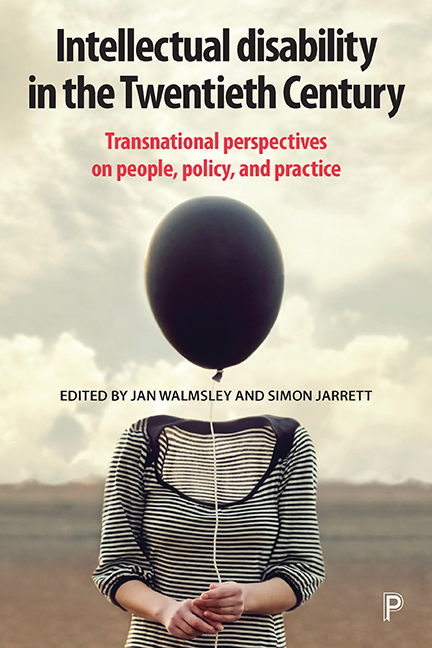 Intellectual Disability in the Twentieth Century
Intellectual Disability in the Twentieth Century Book contents
- Frontmatter
- Contents
- Notes on editors and contributors
- Introduction
- one Paradoxical lives: intellectual disability policy and practice in twentieth-century Australia
- two Tracing the historical and ideological roots of services for people with intellectual disabilities in Austria
- three Time of paradoxes: what the twentieth century was like for people with intellectual disabilities living in Czechoslovakia/Czech Republic
- four Intellectual disability in twentieth-century Ghana
- five A Greek Neverland: the history of the Leros asylums’ inmates with intellectual disability (1958–95)
- six Intellectual disability in Hong Kong: then and now
- seven People with intellectual disabilities in the European semi-periphery: the case of Hungary
- eight People with intellectual disabilities in Iceland in the twentieth century: sterilisation, social role valorisation and ‘normal life’
- nine Institutionalisation in twentieth-century New Zealand
- ten ‘My life in the institution’ and ‘My life in the community’: policies and practice in Taiwan
- eleven Intellectual disability policy and practice in twentieth-century United Kingdom
- twelve From social menace to unfulfilled promise: the evolution of policy and practice towards people with intellectual disabilities in the United States
- Index
ten - ‘My life in the institution’ and ‘My life in the community’: policies and practice in Taiwan
Published online by Cambridge University Press: 27 April 2022
- Frontmatter
- Contents
- Notes on editors and contributors
- Introduction
- one Paradoxical lives: intellectual disability policy and practice in twentieth-century Australia
- two Tracing the historical and ideological roots of services for people with intellectual disabilities in Austria
- three Time of paradoxes: what the twentieth century was like for people with intellectual disabilities living in Czechoslovakia/Czech Republic
- four Intellectual disability in twentieth-century Ghana
- five A Greek Neverland: the history of the Leros asylums’ inmates with intellectual disability (1958–95)
- six Intellectual disability in Hong Kong: then and now
- seven People with intellectual disabilities in the European semi-periphery: the case of Hungary
- eight People with intellectual disabilities in Iceland in the twentieth century: sterilisation, social role valorisation and ‘normal life’
- nine Institutionalisation in twentieth-century New Zealand
- ten ‘My life in the institution’ and ‘My life in the community’: policies and practice in Taiwan
- eleven Intellectual disability policy and practice in twentieth-century United Kingdom
- twelve From social menace to unfulfilled promise: the evolution of policy and practice towards people with intellectual disabilities in the United States
- Index
Summary
Introduction
This chapter considers the history of people with intellectual disabilities in Taiwan in the twentieth century. It opens with an account of the historical and political context, before considering the life stories of three Taiwanese citizens with intellectual disability.
Historical and political context in Taiwan
After the Second World War, Japan left Taiwan, which it had colonised for 50 years. Subsequently Taiwan was governed under martial law by the Republic of China (ROC). Following the Chinese Civil War, the People's Republic of China (PRC) took power in China and the ROC government moved to Taiwan in 1949. Taiwan has been called ‘the state of the Miracle’ (Dessus et al, 1995; Gold, 1986) because of its economic development in the 1970s and 1980s. However, social welfare, including disability welfare, was not part of the government's bureaucracy until 1980 when three welfare laws – the law for the elderly, the social assistance law and the law for the disabled – were enacted and implemented.
The year martial law was abolished, 1987, was a landmark for all Taiwanese people including disabled people. Non-profit organisations working for vulnerable people were legalised; welfare for disabled people was promoted by various non-governmental organisations (NGOs), following public campaigning and lobbying that sought to mobilise assistance for disabled people. In the 1990s, as a result of these efforts, the welfare law for the disabled was amended (eg in 1990 and 1997), and additional resources were allocated in particular for the establishment of institutions for people with intellectual disabilities. NGOs were integrated as major partners with the official welfare system (Hsiao and Sun, 2000; Chou et al, 2006). Privatisation became the major trend in welfare services in the 1990s; most institutions were established and managed by NGOs during that period.
Taiwan became a democratic country with a president elected by the people in 1997, and 2000 saw the first transformation of government from the old party, established in China, to a new party, established in 1986 in Taiwan. As a result of democratisation, the government was obliged to concern itself with social needs. Meanwhile, Taiwan was influenced by the welfare experiences of Western and other East Asian countries like Japan. These influences led, for example, to the creation of the independent living movement for people with intellectual disabilities in Taiwan in 2001.
- Type
- Chapter
- Information
- Intellectual Disability in the Twentieth CenturyTransnational Perspectives on People, Policy, and Practice, pp. 165 - 176Publisher: Bristol University PressPrint publication year: 2019


